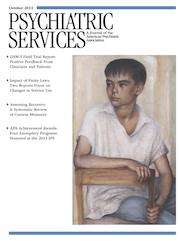Stepped Care: An Alternative to Routine Extended Treatment for Patients With Borderline Personality Disorder
Abstract
This review examined evidence supporting stepped care for borderline personality disorder as an alternative to routine extended treatment. Empirical studies have shown that patients with borderline personality disorder have a heterogeneous course, but symptomatic improvement can sometimes be relatively rapid. Currently, there is no evidence that any long-term treatment is superior to briefer interventions for borderline personality disorder. Long-term therapy may not be necessary for all patients, and its routine use leads to access problems. A stepped-care model, similar to models applied to other severe mental disorders, might provide a better use of resources. Stepped care can be used to limit the use of expensive programs and reduce waiting lists. Not all patients with borderline personality disorder can be treated briefly, but a stepped-care model allows those with less severe symptoms to be managed with fewer resources, freeing up more time and personnel for the treatment of those who need treatment the most.



